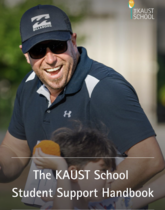Student Support Services
Inclusion is one of our core values at TKS. It’s also absolutely central to the work of our Student Support team.
TKS supports all staff in advocating for diverse learners. This ensures students participate meaningfully where there is access for our young people to become agents of their own learning.
This critical work can only be realized through our ongoing partnership with parents, students and staff. We recognize the value of family partnerships in the learning journeys of our students, and commit to actively enhance the learning experiences of our students, through intentional engagement with parents and families at KAUST.

Student Support Services are the responsibility of all educators at TKS. The expertise of the Student Support team allows for a specialized approach to working directly with students, as well as sharing expertise to build capacity around the school. This is important to appropriately challenge, educate and motivate each student to reach their full potential.
It is essential for each child to understand themselves as learners to allow for a more meaningful and engaging educational experience. This collaborative process seeks to ensure students are accessing each learning opportunity socially, emotionally, and academically.
Who We Are
The Student Support department provides a range of direct and indirect multidisciplinary and specialized services including:
- Talent and Enrichment - Talent and Enrichment Coordinator
- Individualized Learning Program - Coordinator and Teaching Assistants
- School Psychology Services - School Psychologist
- English Language Learner/ Multilingual Learner Support - Coordinator with faculty representatives in Kindergarten, Elementary, and Secondary Schools
- Counseling for Kindergarten, Elementary, and Secondary Schools and post-secondary/university counseling for Secondary School students
- Learning Support - Divisional Leads, Teachers and Teaching Assistants
- Speech and Language Therapy - Speech and Language Pathologist and coordination with external agencies
Student Support Director
Student Support Director
Message from our Student Support Director
Our Student Support Services team brings a wealth of experience to assist your child in school. Spanning learning support, speech therapy, occupational therapy, educational psychology, talent enrichment, counseling, and English language learners, our team is here when you need us.
The KAUST School Student Support Handbook
The KAUST School Student Support Handbook
The KAUST School Student Support Handbook

What We Do
What We Do
The School Psychology Service works with staff to identify the learning and behavior needs of current students, and assists in the selection and implementation of appropriate strategies and interventions.
This is done via consultation, assessment, and intervention.
The School Psychologist may consult and advise future admissions that may require additional learning or behavioral support. Additionally, the school psychologist serves as the designated Safeguarding Lead, which provides training on child protection and implements policies and practices to keep students safe and support professional practice.
The Counseling Team works collaboratively with all TKS staff to foster an inclusive, holistic, and developmentally appropriate school environment that supports the school’s aim of creating a safe and thriving environment, where students’ social, emotional, and physical well-being is nourished. This is achieved through the delivery of comprehensive, age-appropriate, and culturally sensitive social-emotional skills lessons, and the provision of individual and small group counseling, individual and group academic and college counseling, student and family transition support, and school programming support.
Students may access the counselor directly or through a referral process from parents and/or teachers.
The Speech and Language Pathology Service identifies and addresses students who have communication delays or disorders that are impacting their academic and social performance. Using evidenced-based screenings and assessments, the Speech and Language Pathologist (SLP) provides an intervention that enables students to meet academic standards (within their level of ability) by providing functional classroom strategies, and/or direct interventions when difficulties are present in the following areas: articulation, voice, fluency and language impairments (e.g. expressive, receptive, social communication skills).
The SLP works in partnership with parents, teachers, and the multidisciplinary team to provide professional development and consultation regarding student speech and language development.
The Individualized Learning Program(ILP) facilitates student success for those students with significant additional learning needs and complex learning profiles.
This includes students with moderate to intensive academic, social, cognitive and behavioral needs, as well as those with co-occurring diagnoses.
The ILP team works in collaboration with teachers, parents, and external specialist providers to ensure a well-rounded, transdisciplinary approach to students’ individual growth. Barriers to learning are minimized by following comprehensive individualized learning plans that support specific accommodations, modifications, and additional/alternative programming.
To ensure students have additional opportunities and options as they move through secondary school to graduation, the following is offered as part of the ILP:
- Personalized Pathway is a term we use for options that we provide in secondary school for students in the ILP to study a modified curriculum for some courses.
- Personalized Pathway Courses is the term we use for modified courses that can be studied inside the regular classroom or in a specialized setting within the secondary school. Students may study one or more personalized pathway courses, but a student will not be in the Personalized Pathways for all his/her classes.
The Talent and Enrichment Program embodies the commitment and responsibility to Talent and Enrichment (TAEP) students to provide opportunities and experiences to maximize their high potential and allow them to flourish and thrive.
TAEP strives to identify students who perform at high levels in academic or creative fields compared to their same-age peers. Challenges and stimulation are provided continually through the development and implementation of services both inside and outside the general education classroom.
Services for TAEP students are an integral part of The KAUST school educational program.
Appropriate educational opportunities for these students should meet their unique academic, creative, and social-emotional needs to develop and help them realize their full potential. Students whose abilities and talents are exceptional should be met with specialized learning opportunities commensurate with their needs.
TAEP students are a diverse group with varied abilities and needs and require a range of service options.
Talent and Enrichment services are integrated within the TKS system via collaborative efforts amongst administrators, a talent and enrichment coordinator, classroom teachers, learning support teachers, support staff, parents, and the KAUST community, including robust, comprehensive, and ongoing staff professional development regarding the unique social, emotional and academic needs of highly able learners.
Learning Support Services (LSS) is available to students who may benefit from additional support in one or more academic areas. These services can be accessed by a referral process which incorporates collecting data, meeting with a multidisciplinary team, and identifying a plan for a cycle of observation, intervention, and reflection. Students who access LSS will typically benefit from a level of mild to moderate support. Students will be assigned a case manager to oversee their learning plan and work in collaboration with parents, teachers, and students. LSS works in partnership with parents and teachers to develop a range of teaching and learning strategies to help students to be successful within an inclusive context.
TKS recognizes that students are learning through language whilst simultaneously learning the language, and learning about language. Thus, every teacher at TKS is a language teacher as language is a meaning-making activity. TKS aims to support translanguaging in the classroom; the use of a child’s full linguistic resource to make meaning.
Children are encouraged to continue to develop their home language literacies; this supports the development of English language skills and affirms identity. At GES and GSS, multilingual learners are screened on admission to determine eligibility for ELL support.
TKS uses the WIDA framework as a driver of equity for multilingual learners in curriculum, instruction, and assessment.
The WIDA English Language Development Standards frame language and content integration. Key Language Uses identify prominent language uses across disciplines and Language Expectations identify goals for content-driven language learning.
This information is used to scaffold and differentiate learning outcomes for multilingual learners. The WIDA Model assessment is used for the assessment and monitoring of multilingual learners. The W-APT is used to screen multilingual learners prior to entry into Grade 1.
In Elementary School, multilingual learners identified as new to English have individualized or small-group instructional support both inside and outside the mainstream classroom. Emerging language learners receive small group literacy instruction to develop reading and writing skills.
In Secondary School, Grade 6-8 students with early English Language proficiency receive small group English Language Enrichment instruction in place of world languages, whilst recognizing the importance and connection language has to culture. We encourage students to continue to develop their home language literacies, while they work on refining their English language skills at school.
In Grade 9 students are placed in the Language and Literature class which is co-taught by the subject teacher and the academic language support teacher or throughout the school. The staff has access to the teacher development courses offered by Lexis Education, offered by in-house trainers (ELL Inclusion Coordinator and NELL teacher).
Support with scaffolding instruction for English Language Learners is available to staff individually and at grade-level planning meetings. The document ‘Scaffolding Language, Scaffolding Learning’ describes the above ways of working in more detail.


